The Impact of Elimination of Capital Gains and What’s Next
Since 1930, charitable donations in Canada have been eligible for preferential tax treatment. Since that time, there have been several amendments to the Income Tax Act to make donating more attractive to individuals.
One of the most notable changes came in the 2006 federal budget, which eliminated the capital gains tax on gifts of publicly listed securities. Publicly listed securities include instruments such as stocks, trust units, mutual fund units and bonds that trade on Canadian and major international exchanges. Don Johnson, committed philanthropist and expert in this area, has been leading this charge since 1995. AFP and the Canadian Gift Planners Association (CAGP), among others, have supported these changes through lobbying and public affairs work.
For those who entered the profession after 2006, gifts of securities are a normal, standard way of making donations, particularly in major gift fundraising. Yet the 2006 change had an enormous impact on the sector. Donations of publicly listed shares now account for nearly $1 billion each year. Even during the recession of 2008, they recovered and ultimately grew to a high of $822 million in 2014. While still relatively low as a percentage of all donations, publicly listed securities accounted for 6.7% of all claimed donations in 2015.
With two tax advantages for giving this way (a tax credit for the amount of the gift, plus the elimination of the taxable capital gain), it is not surprising that donors find this an attractive way of giving.
In the June 2019 Senate Report on the Charitable Sector, Recommendation 34 suggests a pilot project on the impact of eliminating the capital gains on gifts of privately held shares. This is not a new idea – AFP, CAGP, Imagine Canada and other sector associations have advocated for this change for years. It has even been proposed in prior year budgets (2015) but has not yet come to fruition.
In a 2018 pre-Budget submission, Don Johnson addressed the concerns that kept this change from being enacted into law in 2016.
The first concerns liquidation and valuation. In order for a gift of private securities or real estate to be exempt from capital gains tax, the securities would have to be sold to an arm’s length third-party buyer. Then, a donation to a qualified donee from the proceeds of the sale would have to take place within 30 days. This eliminates the risk to charities of having to hold the shares and try and liquidate them themselves in what can often be a narrow market.
Second, concern regarding the potential for valuation abuse is mitigated by the arm’s-length buyer provision. Donors will naturally seek to obtain the highest price possible for their shares.
The other main concern raised by those who question this change is the cost to the national treasury in foregone tax revenue (capital gains) and the donation tax credit claimed. In a recent submission to Parliament, Don Johnson cites analysis by the C.D. Howe Institute that forecasts that an additional $200 million would be donated in Canada as a result of this tax change, but that 90-95% of those donations would be incremental to current cash gifts. In other words, an additional $200 million would be donated to charities as a result of this measure. The forecast lost revenue through the capital gains tax elimination is $50 to $65 million, or about .004% of the national deficit (in 2018). The net benefit to charities and to Canada’s economy as a result of the ensuing additional donations made possible by this tax measure more than offsets lost tax revenue.
This is an initiative that is likely going to keep being promoted. It is in the interest of all charities in Canada to support programs that increase the likelihood of donations, particularly in an era when funding from government itself for our mission-based work and essential programs continues to decline.
That gifts of private securities were mentioned in the Senate Report is a testament to the many talented individuals and professionals employed in the sector and who volunteer for AFP and other sector organizations. It is through the discussion and championing of ideas like this (and donations of publicly listed securities before them) that brings about change of benefit to the sector as a whole.
Stay tuned…
References:
- Report on Federal Tax Expenditures – Concepts, Estimates and Evaluations 2018. Dufournaud-Labelle, Maxime and Legree, Scott. Department of Finance, Government of Canada.
- Submission to the House of Commons Standing Committee on Finance: Pre-Budget Consultations. Johnson, Donald K. July 2018.
- Federal Budget Eliminates Capital Gains Tax on Gifts of Securities. Neely, Sara and Moxham, Elizabeth. The Scrivener. Vol 15, Number 2, Summer 2006.
- Capital Gains Exemption Extended to Gifts of Private Shares and Real Estate. Social Impact Newsletter. Miller Thomson. April 21, 2015.
- Catalyst for Change: A Roadmap to a Stronger Charitable Sector. The Honourable Terry M. Mercer and The Honourable Ratna Omidvar. June 2019.





